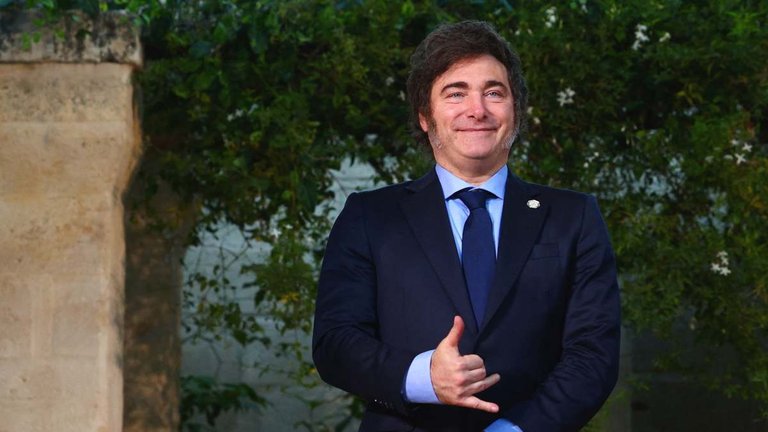
Latin American finance
Investors remain encouraged by the potential of Argentina's markets, underpinned by the monetary-financial policies of controversial president Javier Milei. The lifting of a prolonged de facto blockade to the free exchange of foreign currency is one of the main expectations of the stakeholders concentrated in the Argentine market, together with the signing of a new agreement with the IMF that will allow the raising of fresh funds. “The potential of the Argentine market is renewed encouragingly with very attractive investment alternatives for their returns in dollars, in the face of an exchange rate controlled by the central bank,” a financial agent told Reuters. Since May 2018, the country risk had not been below 500 basis points, being reported at 444 in the morning session this Tuesday, although it ended at 561 after correcting downward.
During the past year, the Argentine economy has been estimated to have decreased between 1.6 and 3.5%, but projections are very positive for 2025, with a forecast of growth between 4.3 and 5%. Inflation is estimated to stand at 26% at the end of this year, down from 117.8% year-on-year in 2024. But it remains to be seen if all this wave of confidence translates into a representative improvement in the quality and quantity of consumption indexes of Argentines, while poverty swallowed thousands of them at the beginning of the year due to the impact of Milei's harsh, orthodox adjustment. For the time being, a consulting firm claims that for the first time, those who think they are better off than a year ago outnumber those who have the opposite view. Social tension seems to have eased somewhat in the last months of the year.
 Source
SourceMore from the region
In the Aztec financial market, the local peso appreciated early Monday following a report in the Washington Post that Trump's threat to impose heavy tariffs, in the end, could target just certain sectors critical to U.S. national security—copper, whose sales propel the Chilean economy, also benefited from that supposed change in stance. The mogul later flagged the WaPo story as fake news and reinforced its position on Tuesday. Nevertheless, the Mexican peso struggled yesterday to continue the positive inertia produced by the mere possibility of a less aggressive tariff approach, although it ended trading slightly lower than Monday's close when it reported its best daily gain since September.
The Mexican stock market's main index, the S&P/BMV IPC, has come out stronger in the last two trading days, including Tuesday. Reuters conducted a survey confirming the moderation trend in inflation—with an estimated 0.40% growth in consumer prices in December—which would encourage the monetary authority to relax more its policies. Overall, at the close of markets on Tuesday, the performance of a basket of six key currencies for the region was mixed—Brazilian, Chilean, and Colombian currencies gained—, as the dollar rallied following new data linked to potential policy actions by the U.S. Federal Reserve. All six major stock indices in the region closed in the green.
In the shopping malls of Santiago de Chile and the beaches of Brazil, Argentines are snapping up clothes, electronics and caipirinhas, taking advantage of cheaper prices in other countries as domestic costs in dollar terms spike on a stronger local peso https://t.co/HIklsOBYt1 pic.twitter.com/8dbJo4LwTu
— Reuters (@Reuters) January 6, 2025
So Trump...
This Tuesday, the future 47th U.S. president again referred to Mexico and the Panama Canal. While Claudia Sheinbaum has mobilized her cabinet to operate on the run in the areas most sensitive to Trump—i.e. irregular migration, China's trade influence, and cancer posed by organized crime—, he spoke today as if nothing had happened. From his bunker at Mar-a-Lago, Trump again threatened to impose tariffs on Mexico and Canada, reinforcing the cartel problem in the Aztec nation—they run it, he says. In the case of Panama, although it sounds like rhetoric or big-boy bullying, Trump did not commit to rule out the use of force to see an improvement in the dynamics he has denounced. Who is only days away from sitting again at the Resolute desk insisted on the narrative that the canal was built for the U.S. military and is now operated by China. He also introduced as a novelty the idea of renaming the “Gulf of Mexico” as the “Gulf of America”. You need to see him.
Trump says that the drug cartels run Mexico and that the country is in deep trouble
— Ryan Saavedra (@RealSaavedra) January 7, 2025
He also announces that he is changing the name of the “Gulf of Mexico” to the “Gulf of America” pic.twitter.com/bSpmJp5SZY
President-elect Trump: "We're going to be changing the name of the Gulf of Mexico to the Gulf of America...what a beautiful name. It's appropriate." pic.twitter.com/ZspLXgkgcZ
— CSPAN (@cspan) January 7, 2025
Reporter: Can you assure the world that as you try to get control of Greenland and the Panama Canal, you are not going to use military or economic coercion?
— Acyn (@Acyn) January 7, 2025
Trump: No.. I can’t assure you on either of those two. pic.twitter.com/e6PvXcxDCi
And this is all for our report today. I have referenced the sources dynamically in the text, and remember you can learn how and where to follow the LATAM trail news by reading my work here. Have a nice day.


Thanks for sharing such a good post! Keep engaging. Curated with love by Ecency.

Thanks for such strong support to my work here in the blockchain, via Ecency. Best regards from Cuba.
I do not understand this statement. 26% is not higher than 117.8%.
While you are correct Trump did not rule out military aggression regarding the Panama Canal or Greenland, the question he was answering asked about both military action and economic action, so for him to answer no to the question would have not only ruled out military action but economic action, which is certainly his primary mechanism to influence other nations.
Thanks!
Hello friend. I made a mistake in stating that the inflation trend is upward in Argentina, I have corrected it. As far as Trump's position is concerned, I am remarking on the use of force because one does not expect that even from the discourse such a variant would be considered in the case of the Panama Canal. Economic coercion is a daily occurrence. Thank you again, always, for providing value and context to my here.